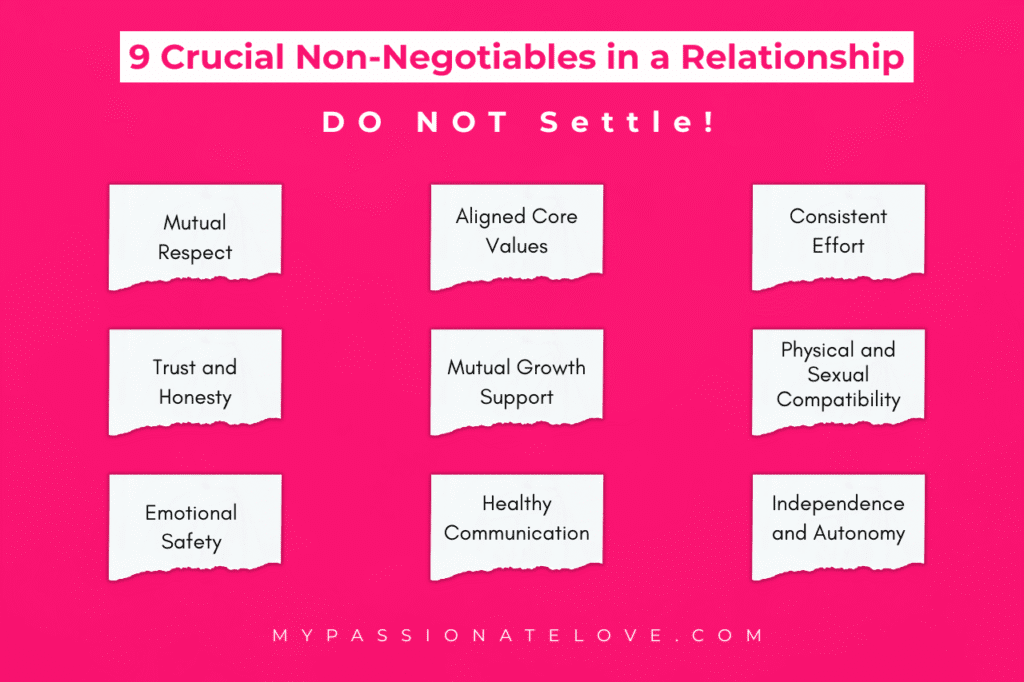There comes a moment in every relationship, often after the honeymoon phase fades, sometimes after you’ve already made vows or built a life together, when you realize that love alone isn’t enough.
You can love someone deeply and still feel unseen, unheard, or unvalued.
That’s when you start asking the hard questions: Where do I draw the line? What amends am I willing to make, and what must stay firm?
These questions aren’t always easy to answer.
But the truth is, the health of any romantic relationship often hinges on something we tend to ignore until it’s too late.
Boundaries.
And not just any boundaries; non-negotiables in a relationship.
The core values.
The things that shape the way you love, trust, and show up for someone, and how you expect them to show up for you.
When you compromise on these, resentment builds. You lose yourself. And slowly, the relationship becomes a space where neither of you can thrive.
Table of Contents
ToggleWhat Exactly Are Non-Negotiables in a Relationship and How Do They Differ From Negotiables?
Non-negotiables are your absolute must-haves and can’t-accepts; the boundaries that define your emotional, mental, and physical well-being.
They’re the lines that, if crossed, leave you feeling drained, disrespected, or unrecognizable to yourself.
Negotiables, on the other hand, are the areas where you can bend.
Maybe you love spontaneity while your partner thrives on routine.
Perhaps you’re a neat freak and they’re… not. These differences can be worked through with communication and compromise.
But non-negotiables? Those aren’t up for debate.
They’re rooted in your core values, your sense of safety, and your self-worth.
The moment you start bargaining with them, you’re not fixing the relationship. You’re breaking yourself.
Think of it this way: negotiables are the furniture in a house. You can rearrange, replace, or learn to live with them.
Non-negotiables are the load-bearing walls. Remove them, and the whole structure collapses.
So before you dismiss that nagging feeling of this isn’t right, ask yourself: Am I compromising, or am I sacrificing something essential?
Because knowing the difference changes everything.
Why Is It Important to Establish Non-Negotiables in a Relationship?
You wouldn’t sign a contract without reading the fine print. You wouldn’t move into a house without checking if the foundation is solid.
In the same way, entering a relationship, whether casual, committed, or lifelong, without knowing your boundaries is like building on shaky ground.
Establishing non-negotiables in a man or woman creates self-awareness and respect. It’s what separates a relationship that survives from one that truly thrives.
Non-negotiables exist to protect your peace, your dignity, and the integrity of the relationship. Without them, you risk:
- Drifting into resentment: Every time you swallow a need or ignore a red flag, a quiet bitterness takes root. One day, you’ll realize you’ve been keeping score without meaning to.
- Attracting the wrong partners: If you don’t know what you won’t tolerate, you’ll keep ending up with people who push limits because they sense you don’t enforce any.
- Losing your identity: Love should expand you, not shrink you. But without clear non-negotiables, you’ll mold yourself into what someone else wants, forgetting who you were in the first place.
Knowing what you absolutely need in a partner protects you from settling for less. It also fosters honest conversations early on.
Instead of hoping someone will “change eventually,” you get to speak clearly about your values and expectations. This doesn’t push love away. It invites in the kind of love that’s built to last.
Bottom line? When both people in a relationship know what truly matters to them, and honor those boundaries, the connection has a far better chance of growing into something real and lasting.
9 Crucial Non-Negotiables for a Successful Relationship

Every healthy relationship needs a solid foundation. While love and chemistry matter, they’re not enough on their own. Understanding what you absolutely can’t compromise on is key.
Below are some incredible examples of non-negotiables in a relationship for a woman, man, or any partner, highlighting the values and behaviors that support emotional safety, mutual respect, and long-term commitment.
1. Mutual Respect
At the foundation of all healthy connections lies respect, arguably the most critical among non-negotiables for any romantic relationship.
Respect manifests in how you speak to each other during disagreements, how you treat each other’s boundaries, and how you represent each other when apart.
It means no name-calling, no public humiliation, and no dismissing of feelings.
When respect erodes, everything else follows. Trust fractures, intimacy withers, and resentment grows.
Many couples who sit in our counseling room point to disrespect as the first domino that fell before their relationship collapsed.
Without mutual respect, love eventually suffocates under the weight of accumulated hurts and indignities.
2. Trust and Honesty
You can’t build anything meaningful without trust. Lies, no matter how small, erode the bond over time.
Trust means you can count on your partner to be real with you, not just when it’s easy, but when it’s hard too.
Honesty, even when uncomfortable, shows emotional maturity.
This is one of the most common examples of non-negotiables in a relationship because without it, you’re left with anxiety, suspicion, and emotional distance.
A solid relationship depends on truth being the norm, not the exception.
3. Emotional Safety
A relationship without emotional safety is like a house without walls. It can’t protect you from life’s storms.
Emotional safety means creating an environment where both partners can express their authentic thoughts and feelings without fear of explosive anger, stonewalling, or emotional punishment.
It means disagreements focus on issues rather than attacking character.
It means neither partner walks on eggshells, constantly monitoring their words to avoid triggering the other.
Emotional safety requires regulated responses even during conflict.
The absence of this safety creates profound anxiety; your nervous system remains on high alert, your authentic self goes into hiding, and the relationship becomes a source of stress rather than security.
4. Aligned Core Values
While differences add richness to relationships, fundamental value alignment counts among the critical non-negotiables in a relationship.
These values might include views on family, finances, religion, politics, or life priorities.
When core values fundamentally conflict, daily decisions become battlegrounds rather than opportunities for collaboration.
Someone who dreams of children will face heartbreak with a partner firmly against parenthood.
Someone who values financial security will struggle with a chronically impulsive spender.
While compromise exists in many areas, trying to compromise on your deepest values often leads to hidden resentment and eventual breakdown.
Choose someone heading in a generally compatible life direction.
5. Mutual Growth Support
The most fulfilling relationships feature partners who champion each other’s evolution.
This means supporting each other’s goals, celebrating achievements without jealousy, and encouraging personal development.
A partner who feels threatened by your success, who subtly undermines your confidence, or who expects you to remain static while they evolve creates a foundation for future resentment.
True partnership means wanting the highest good for each other, even when that growth feels challenging or inconvenient.
Growth-supporting partners don’t compete. They collaborate on building each other’s best possible lives.
6. Healthy Communication
Communication isn’t just about talking, it’s about how you listen, respond, and work through hard things.
Can you speak openly without being shut down? Can disagreements happen without things turning ugly?
Healthy communication builds connection and clarity. Poor communication, over time, causes distance, resentment, and emotional fatigue.
For most people, this ranks high on their list of non-negotiables in a relationship because it affects every area, from conflict resolution to intimacy to everyday connection.
7. Consistent Effort
Love requires more than words. It needs action.
Consistent effort means showing up every day, not just when it’s easy or convenient. It’s one of the most overlooked non-negotiables for a successful relationship.
One person shouldn’t always be the one initiating connection, resolving issues, or keeping things moving forward.
Carrying the emotional labor alone wears down love faster than any single argument ever could.
Real partnership thrives when both people invest equally in maintaining the bond, even when life gets tough.
8. Physical and Sexual Compatibility
While often uncomfortable to discuss, physical compatibility ranks among the crucial relationship non-negotiables.
It encompasses both general physical affection needs and sexual compatibility.
Significant mismatches in desire, preferences, or attitudes toward intimacy create recurring tension that often intensifies with time.
One partner consistently feeling rejected while another feels pressured creates a negative cycle around what should be a bonding experience.
While perfect alignment is rare, both partners should feel their physical and intimate needs matter and deserve respectful attention and compromise.
This compatibility requires ongoing communication as needs evolve throughout the relationship.
9. Independence and Autonomy
A healthy relationship doesn’t absorb your entire identity. It enhances it.
Independence means maintaining individual identities, friendships, interests, and personal space alongside the relationship.
It means freedom from controlling behaviors, excessive jealousy, or demands for constant contact.
A partner who respects your autonomy trusts you without constant supervision and supports connections beyond the relationship.
Contrary to romantic myths, healthy relationships require breathing room; two whole people choosing each other rather than two halves desperately clinging together.
Without this independence, relationships become suffocating rather than nurturing, breeding resentment that eventually overwhelms affection.
Related Posts
Final Thoughts
Non-negotiables in relationships aren’t restrictions. They’re liberations. They free you from the exhausting cycle of questioning, justifying, and settling for less than you deserve.
So if you take nothing else from this, remember: A relationship that asks you to abandon your core standards isn’t one that will ever fulfill you.
The right person won’t make you question whether your non-negotiables are “too much.” They’ll prove, through their actions, that you were never asking for enough.
Hold to what matters. The love that’s truly meant for you won’t just respect your boundaries. It will make you wonder why you ever considered lowering them.

